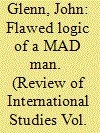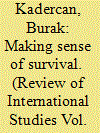| Srl | Item |
| 1 |
ID:
114999


|
|
|
|
|
| Publication |
2011.
|
| Summary/Abstract |
In a recent issue of this journal Campbell Craig put forward an amended version of Power Preponderance theory seeking to explain why US unipolar predominance has turned out to be not simply a 'moment' and as such represents 'a serious anomaly for neorealist theory'. In using Waltz's own work on how nuclear weapons affect state behaviour, Craig appears to further bolster the case for Power Preponderance theory. Craig exploits what at first sight seems to be a contradiction in Waltz's work. However, Craig's error is that he treats security qua territorial security rather than considering a more encompassing view of state security. In the arena of 'secondary' security issues the usual logic of counter-balancing with conventional military forces still holds sway. This reply argues that a balance of power will return to the international system, it is just that at this moment no country or coalition of countries is quite up to the task.
|
|
|
|
|
|
|
|
|
|
|
|
|
|
|
|
| 2 |
ID:
123401


|
|
|
|
|
| Publication |
2013.
|
| Summary/Abstract |
The assumption that 'states' primary goal is survival' lies at the heart of the neorealist paradigm. A careful examination of the assumption, however, reveals that neorealists draw upon a number of distinct interpretations of the 'survival assumption' that are then treated as if they are the same, pointing towards conceptual problems that surround the treatment of state preferences. This article offers a specification that focuses on two questions that highlight the role and function of the survival assumption in the neorealist logic: (i) what do states have to lose if they fail to adopt self-help strategies?; and (ii) how does concern for relevant losses motivate state behaviour and affect international outcomes? Answering these questions through the exploration of governing elites' sensitivity towards regime stability and territorial integrity of the state, in turn, addresses the aforementioned conceptual problems. This specification has further implications for the debates among defensive and offensive realists, potential extensions of the neorealist logic beyond the Westphalian states, and the relationship between neorealist theory and policy analysis.
|
|
|
|
|
|
|
|
|
|
|
|
|
|
|
|